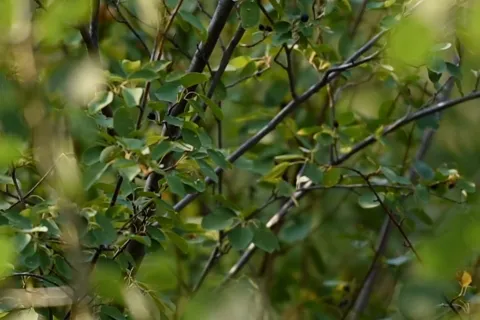Roots are taking shape for UBC Okanagan’s Indigenous Micro-Forest

A version of this article originally appeared on UBC Okanagan School of Engineering.
Funding from the Indigenous Strategic Initiatives Fund has enabled relationship building with the Syilx Okanagan People to establish an Indigenous-inspired natural space for teaching and learning.
The Indigenous Micro-Forest project endeavours to establish a self-sustainable, green, biodiverse ecosystem on UBC Okanagan campus, guided by Indigenous traditional ecological knowledge to reintroduce and foster native species that create green spaces and offer ways to mitigate and adapt to climate change. The permacultural initiative provides students, faculty, staff and the community a beautiful space for learning and reflection.
The proposal was co-submitted by Associate Professor Jeanette Armstrong and Assistant Professor of Teaching Alon Eisenstein along with faculty from UBCO School of Engineering, Faculty of Arts and Social Sciences, and the Faculty of Science. The ISI Fund seeks to advance the rights of Indigenous peoples as well as the crucial journey towards meaningful reconciliation.
“Indigenous Peoples have a special relationship with the land, and this initiative is a way of acknowledging and elevating that through the application of Indigenous traditional knowledge,” explained Eisenstein.
The UBC Okanagan Indigenous Micro-Forest supports a climate-friendly culture shift by transitioning the narrative of climate action from climate harm mitigation to proactive climate stewardship.
“By fostering a sense of long-term responsibility, the forest demonstrates UBC’s commitment to future generations by investing in the campus and the region’s ecosystem while promoting biodiversity and developing a strong legacy that will support nature and life,” says Renee Leboe, manager of Engineering Academic Services. “Our students especially will benefit from having a space such as this on our campus.”
At the root of the proposal’s success was a strong and diverse team with existing relationship and collaboration with the Syilx Peoples, UBC faculty, staff and students. Indigenous voices and perspectives lead the project with members of the Syilx community co-creating the design and the project throughout its stages. The Forest also recognizes the integral connection of UBC with Indigenous partners, and the land with which it resides.
The Micro-Forest will be larger than several full-sized basketball courts and, while campus planning and the project team are still working out the location, it will be located near the Engineering, Management and Education Building. Planning is expected to take place over the next year as the project team collaborates with the En’owkin Centre, Knowledge Keepers and the community. The Micro-Forest will include native plants to the Okanagan, which will be selected together with the Knowledge Keepers following traditional ecological knowledge. The site preparation and planting will take between two to five years to ensure the project and the ecosystem are developed in a sustainable manner.
The Indigenous Micro-Forest will serve as a cultural focal point for learning about Indigenous culture and language, making them visible and prominent on the UBC Okanagan campus. In the long term, the project will contribute to the overall sustainability of the UBC Okanagan campus by proactively creating a biodiverse urban ecosystem that benefits the environmental and social aspects of campus living.


